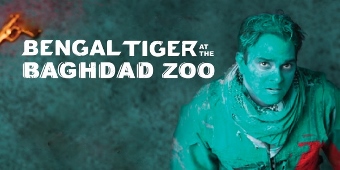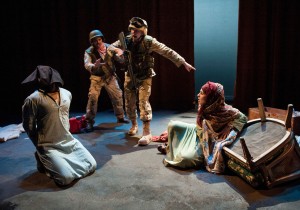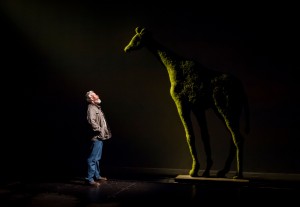FEARFUL SYMMETRY
In Rajiv Joseph’s Bengal Tiger at the Baghdad Zoo, inspired by an actual 2003 event involving occupying soldiers in Iraq, a slain tiger takes center stage and discusses from the perspective of the newly dead that there is a flash of retrospective 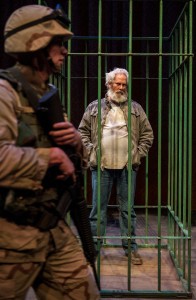 honesty which instills a global rather than personal viewpoint. The Tiger is the first of many ghosts who populate the stage, and engages in an introspection that suggests it would be well-advised to consider how we will be remembered in the end.
honesty which instills a global rather than personal viewpoint. The Tiger is the first of many ghosts who populate the stage, and engages in an introspection that suggests it would be well-advised to consider how we will be remembered in the end.
Tom and Kev are the U. S. Marines who kill the tiger when he succumbs to his nature. “I got hungry and I got stupid,” the fresh specter complains. He then wanders the burning city of Baghdad; an itinerant philosopher not inclined to theodicy, but forced to confront the possible existence of something else only due to his continued existence. “All tigers are atheists: hell and heaven are merely metaphorical constructs that describe ’˜hungry’ and ’˜not hungry.’” He has difficulty conceiving of a just and loving deity who would create a child-devouring predator, let alone the carnage that he continues to witness.
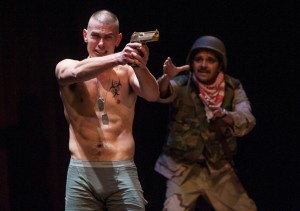 This play is not a critique of U. S. foreign policy, but instead a meditation on its consequences. It does not consider the culpability of a group, but examines the all-too-human actions of individuals: theft, insult, violence, and betrayal. The Tiger, played with splendid drollery by Troy West, is a gentle soul when compared to the foully sadistic Uday Hussein, a monster that Kareem Bandealy manages to portray with a playboy’s élan. With particularly adept nuance, Anish Jethmalani depicts Musa, an everyman with the wrong employers, a botanical sculptor reduced to translating “official military business,” and who ultimately executes a sly reference to Camus.
This play is not a critique of U. S. foreign policy, but instead a meditation on its consequences. It does not consider the culpability of a group, but examines the all-too-human actions of individuals: theft, insult, violence, and betrayal. The Tiger, played with splendid drollery by Troy West, is a gentle soul when compared to the foully sadistic Uday Hussein, a monster that Kareem Bandealy manages to portray with a playboy’s élan. With particularly adept nuance, Anish Jethmalani depicts Musa, an everyman with the wrong employers, a botanical sculptor reduced to translating “official military business,” and who ultimately executes a sly reference to Camus.
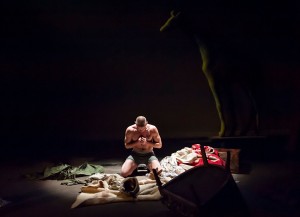 Walter Owen Briggs and JJ Phillips present the two U. S. Marines with enough self-exposure to avoid “Ooh-Rah!” caricature, successfully depicting their journey from bravado to loss, and perhaps even transfiguration in the case of Kev, the character assigned some of the play’s broadest comic lines in the its first half. Atra Asdou portrays both Musa’s sacrificed sister and a patient prostitute with equal accuracy. Amy J. Carle performs the remaining female roles, convincingly declaiming in Arabic during key scenes.
Walter Owen Briggs and JJ Phillips present the two U. S. Marines with enough self-exposure to avoid “Ooh-Rah!” caricature, successfully depicting their journey from bravado to loss, and perhaps even transfiguration in the case of Kev, the character assigned some of the play’s broadest comic lines in the its first half. Atra Asdou portrays both Musa’s sacrificed sister and a patient prostitute with equal accuracy. Amy J. Carle performs the remaining female roles, convincingly declaiming in Arabic during key scenes.
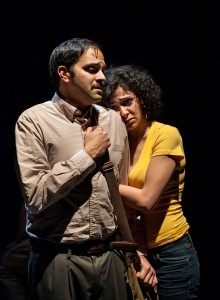 Lookingglass maintains its reputation for visual flair, from the stark setting of the tiger’s erstwhile home – the Baghdad zoo – to the magical garden constructed by Musa before the war. Scenic designer Daniel Ostling’s decision to dangle animal topiaries like figures in a nursery mobile injects a pleasantly fanciful note (the topiaries constructed by Sean K. Walters). Director Heidi Stillman sets a steady tempo, balancing magical realism with the jagged acceleration of the play’s events.
Lookingglass maintains its reputation for visual flair, from the stark setting of the tiger’s erstwhile home – the Baghdad zoo – to the magical garden constructed by Musa before the war. Scenic designer Daniel Ostling’s decision to dangle animal topiaries like figures in a nursery mobile injects a pleasantly fanciful note (the topiaries constructed by Sean K. Walters). Director Heidi Stillman sets a steady tempo, balancing magical realism with the jagged acceleration of the play’s events.
In the end, there is a case of mistaken identity, and the last living character announces that he is not who the Tiger thinks he is, that he is sorry, and that he should go. In the cosmology of Bengal Tiger at the Baghdad Zoo the same broken apology might come from the lips of God.
photos by Liz Lauren
Bengal Tiger at the Baghdad Zoo
Lookingglass Theatre Company
(inside Chicago’s Water Tower Water Works)
scheduled to end on March 17, 2013
for tickets, call 312-337-0665 or visit http://www.lookingglasstheatre.org/
